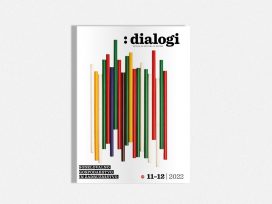The human rights ombudsman needs an ombudsman
The institution of human rights ombudsman is experiencing a crisis in public opinion, and by extension also a political crisis. As the mandate of Matjaz Hanzek, the second of Slovenia’s ombudsmen, comes to an end, some have been unable to resist heaping scorn and contempt on his record. For the past two years we have even been hearing constant calls to get rid of this office, and especially this particular ombudsman. These hostile assessments have been pronounced more than once in Parliament by members of the ruling coalition. For those riding the waves of xenophobia and exclusion, the regular alerts of human rights violations in the cases of asylum-seekers, Roma, the erased, and Muslims are regarded as nothing less than blasphemous. Hanzek has had to defend himself against various trumped-up charges, including pedophilia, his family members have been attacked, and he has received death threats. A report of the true state of affairs has come out in the form of a report by the European Commission against Racism and Intolerance (ECRI) in February of this year, condemning the hate speech of parliamentarians, while praising the role of the ombudsman and recommending “that the Slovenian authorities ensure compliance of State and other public administrations with the recommendations and findings of the Ombudsman in all cases”.
This balm on an open wound did not help much. A final blow was being prepared, as the ECRI report had no effect. A segment of the political leadership and the population rushed to try to discredit Hanzek by turning him into a clown. This was faithfully followed by the media: because purely by coincidence Hanzek’s final day fell on Shrove Tuesday, this occasion was used to hurl so many insults at him that one can barely remember them all. The most widely read Slovene newspaper reported on 20 February that the ombudsman “decided to make his departure on Shrove Tuesday because of the silly checkered shirts he is usually dressed in”. As if this weren’t enough, the author of this mirthful investigation of the real reasons for Hanzek’s Shrove Tuesday departure offered an alternative explanation: he chose this day “perhaps because of the silliness and rashness he displayed when he whiningly tattled on his own country to Europe for supposedly trampling the rights of Elka Strojan’s Roma family”. His six-year “inventory”, the article continues, has been hidden behind a mask, and as “a sinner he has dressed himself in sackcloth and ashes”. Enough quotations, since any more would make it look as though Hanzek left his office nailed to a cross. Portrayed as a whining sinner in a silly checkered shirt, demonized and hated, with few words in his support.
The truth of the matter is entirely different from this picture: he was one of the very best ombudsmen. Uncompromising and austere, as any government should wish, impulsive and importunate, just as he promised at the beginning of his mandate. The job of the ombudsman is not to praise the authorities, no matter how much some people seem to insist. Nor does monitoring of human rights require niceness, and the suffering of victims is not something to smile about. But criticism seems for some to have disappeared from the list of permissible functions of the office, and the ombudsman therefore became superfluous and even dangerous. Throughout the whole of his mandate the expression on his face was more or less the same: displaying concern. Should it have expressed satisfaction instead?
The attacks on Hanzek have to some degree exposed the crisis of the institution of the ombudsman, and this is connected not only with the person heading the office, who was deprived by politics of two assistants even before the end of his mandate. The harbingers of a more relaxed political village culture have unfortunately not yet realized that concern regarding constitutional rights, restrictions on personal freedom, social security, workers’ protection, judicial procedures, discrimination, and protection of children’s and human rights, if we list just a few areas, cannot take place unimpeded when the person charged with carrying out these tasks is demonized. When Hanzek first took on the position, he was asked whether anything had ever happened to him that had caused him to think that he himself would require the assistance of an ombudsman. And he replied that it hadn’t. His response was to the substance of the question; it could also have been asked and answered at the “formal” level, since the institution of ombudsman would indeed need its own guardian angel, if that would be of any avail. Boycotting and demonizing of the function have shown how low a level Slovenes have reached when it comes to recognizing and respecting human rights.
Ljubo Bavcon, the president of the former Council for the Protection of Human Rights and Fundamental Freedoms, cautioned that while Slovenia at the beginning of the 1990s numbered among nations with a high degree of protection of human rights, it has noticeably regressed in this regard in the last few years. Each day is worse, each day we are closer to where we were 30 or 40 years ago, said Bavcon – in a censored, barely published little news item from the Slovene Press Agency. Opinion leaders and enlightened people are in his opinion obligated to contribute to the building of tolerance and respect for human rights. He has in mind politicians, journalists, educators, and “all those who are called on to express their opinion, to represent these values, to not be silent, to resist when it is necessary.”
The respected professor made an interesting comparison. When Amnesty International was attacked at the end of the 1970s and in the 1980s for drawing attention to human rights violations, the response of those in power in the former Yugoslavia was usually “We reject these hostile, unfair, false, and propagandistic views in disgust.” Sound familiar? Hanzek’s statement – that the illegal relocation, surveillance, and restricted mobility of the Roma family marked the end of the rule of law in Slovenia – was not clearly refuted. It did, however, trigger the old Yugoslav reflex which characterizes appeals for arbitration by international institutions as dangerous and damaging. And so even in communiqu�s from the office of the Prime Minister we read that Hanzek was accusing and smearing Slovenia in front of Europe. As though Slovenia were not part of Europe, but rather some distant Balkan state. As though “ovaj sud” (as Slobodan Milosevic referred to “this court”) and the neutral evaluations of the European Commission were not recognized. Which, by the way, completely supported the ombudsman.
A particular paradox which has escaped many is that the wide debate initiated by Hanzek regarding the intolerance of Slovenes has completely exposed that very trait. Bringing attention to instances of intolerance and trying to rein it in has instead triggered a wave of new expressions of it. The most palpable, albeit indirect, measure of your intolerance is how you react to having it pointed out and what kinds of arguments you use to justify it. Another is how you treat the person who has (justifiably) brought attention to it. The charges heaped upon Hanzek have been beyond the pale.
The institution of the ombudsman is one of the last remaining independent mirrors of any democratic nation with respect for the rule of law. If they succeed in crushing it and turning it into an instrument of the state, the future looks bleak for human rights.
Published 26 March 2007
Original in Slovenian
First published by Dialogi 1-2/2007 (Slovenian version)
Contributed by Dialogi © Boris Vezjak / Dialogi / Eurozine
PDF/PRINTNewsletter
Subscribe to know what’s worth thinking about.



